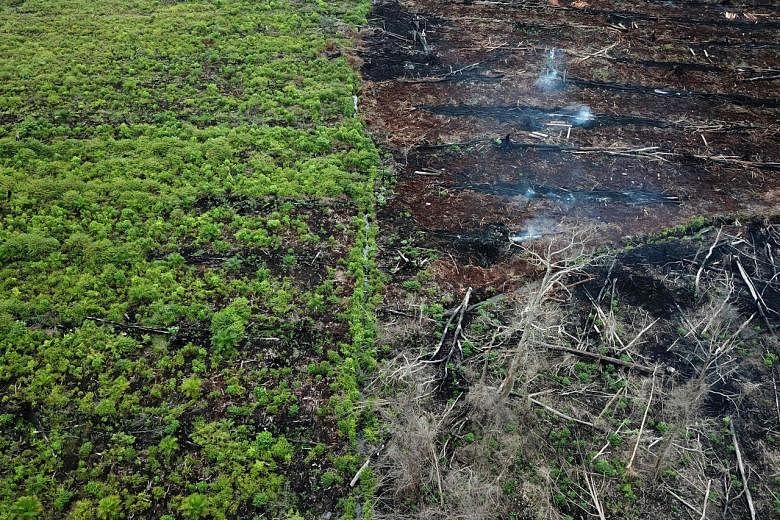SINGAPORE - Indonesia has made significant strides in controlling forest and land fires and aims to reduce their incidence even further by all means possible, Indonesia's Minister for the Environment and Forestry said on Friday (April 9).
In a keynote address to a Temasek Shophouse Conversations event on climate action, Ms Siti Nurbaya Bakar referred to cloud seeding, as well as tools to monitor, report and verify activities on the ground, along with a concerted, collaborative effort to prevent and reduce fires.
"The reduction of forest and land fires has paved the way to augment sustainable livelihoods in the production of life essentials, as well as the sustainable management of peatlands," she said.
Peatlands are major stores of carbon. Indonesia has cleared and drained millions of hectares of peatlands for agriculture, creating highly flammable landscapes that, when burned, create toxic smog and huge amounts of carbon emissions.
The government has in recent years set up an agency to start to restore the most vulnerable areas of peatlands and work with plantation companies but large areas are still badly degraded and the government recently extended and expanded the remit of the agency.
Ms Siti noted that forest and land fires have been significantly reduced from 2,611,411ha in 2015 to 296,492ha in 2020, the latter being about four times the area of Singapore. "We are determined to reduce the incidence even further in the years to come," she said.
Indonesia has also recorded significant drops in the loss of tropical primary rainforest, which fell to 272,000ha in 2020, the fourth annual drop in a row, according to an analysis released last week on the Global Forest Watch online platform of the World Resources Institute (WRI).
Dr Arief Wijaya, climate and forests senior manager at WRI Indonesia, said a combination of government policies, wet weather and weaker demand for palm oil helped Indonesia reduce rainforest loss.
Policies included a temporary moratorium on new oil palm plantation licences and a permanent ban on primary forest and peatland conversions.
Conservationists say Indonesia can do more.
"There have been systematic violations of regulations, allowing new plantation concessions to continue to push into Indonesia's forest estate," said Mr Kiki Taufik, Greenpeace's global head of Indonesia Forest Campaign, adding that Greenpeace found clear violations in Papua Province. "But these same problems occur nationwide."
"We believe that forest and peatland protection policies introduced by the national government - such as the forest moratorium and the oil palm moratorium - have not yielded the reforms promised and are hamstrung by poor implementation and a lack of enforceability," he told The Straits Times.
"In fact, the government can take very little credit for Indonesia's recent fall in deforestation. Instead, it is market dynamics, including the demands of consumers responding to biodiversity loss, fires and human rights abuses for palm oil, that are largely responsible for the decrease."
He said that with palm oil prices surging and plantation groups holding massive uncleared forest land banks, what can be described as "planned deforestation" of the land inside those concessions, was poised to occur.


